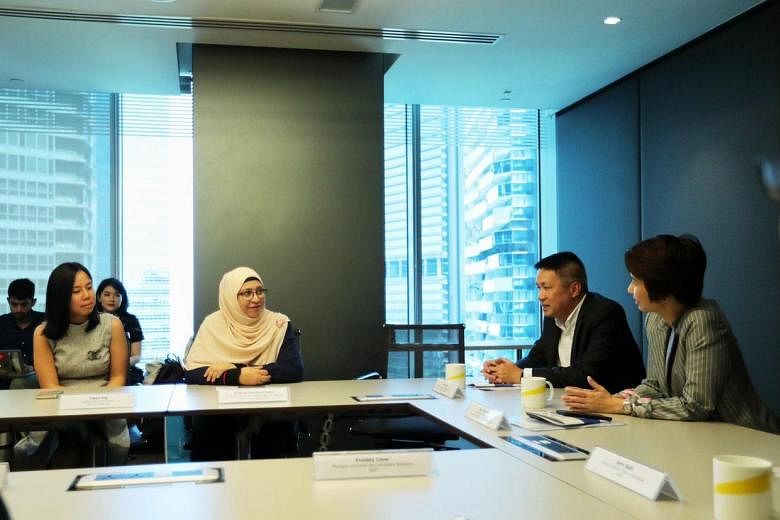SINGAPORE - Job sharing can benefit both employers and workers, with research showing that it increases employee productivity and reduces hiring costs.
But most companies here may have no idea how to work out such an arrangement.
To help them understand how to use job sharing to offer their staff more flexibility, the Manpower Ministry (MOM) and Singapore National Employers Federation (Snef) have introduced an implementation guide.
Job sharing, where two or more people share responsibilities of one full-time job, differs from part-time jobs, which are self-contained jobs with less than 35 hours of work per week.
Senior Parliamentary Secretary for Manpower Low Yen Ling said at the launch of the guide on Friday (May 24) that besides being a boon for young parents, flexi-work arrangements (FWAs) like job sharing can also benefit millennials who value work-life balance.
It also benefits older employees who choose to work at a lower intensity to spend more time with grandchildren or on hobbies.
While job sharing has yet to catch on here, with only 2 per cent of companies offering it, Ms Low said it is growing in popularity in countries such as the United Kingdom and Australia.
For example, two women were appointed in 2017 to the position of director-general for the Rail Group of the Department of Transport in the UK - the first instance of job sharing for such a senior position in the British civil service.
Ms Low, who announced the job-sharing guide during a visit to the offices of professional services firm EY in One Raffles Quay, said flexi-work arrangements can benefit both companies and workers by boosting talent retention and strengthening staff morale while helping people achieve career and family goals in tandem.
She cited research by global organisations that showed that job sharing increased employee productivity by up to 30 per cent and reduced hiring costs by up to 20 per cent.
"The availability of FWAs like job sharing will be even more important especially in our ageing society, where more Singaporeans will have to take on caregiving duties for the old while taking care of their young family members," she told reporters at the event.
The 24-page guide lists steps employers can take.
These include identifying jobs which can be shared by function, geography, time or workload; ensuring workers and supervisors are clear about roles and responsibilities to achieve work outcomes; and fixing a regular time for staff on job sharing and their supervisors to check in with each other.
It also includes success cases as well as a sample addendum which employers can tag on to employment contracts, setting out the reduced working hours and salary agreed on.
The guide was first announced during the debate on the ministry's budget in March.
It is now available online at MOM and Snef's websites and will also be distributed to employers as a small book.
Ms Low encouraged employers to tap the Work-Life Grant, which provides up to $2,000 a year for each regular user of flexi-work arrangements, capped at $70,000 per firm over two years.
Companies can also claim up to $3,500 per user for job-sharing arrangements for full-time professionals, managers, executives and technicians, capped at $35,000 per firm over two years.
Close to four in five of EY's 3,000 or so employees are on FWAs, four of whom are on formal job sharing schemes. The most commonly used arrangements are staggered work hours and telecommuting.
EY's managing partner for Asean and Singapore, Mr Max Loh, said supervisors play a key role in mentoring people who are job sharing and empowering them to give their best.
"It's about building a trusted business environment where we don't focus on being present, we focus on outcomes that our employees can drive for us... If you're really effective working four hours a day, as long as you drive that outcome, that's fine," he said.
Four EY employees are on job sharing now. One of them is mother of two Rashida Mohamed Sadik, a senior consultant for people advisory services, where she handles personal income tax matters for clients.
The 43-year-old wanted to help her daughter with her studies after her grades started to fall in Primary 5, and realised that she did not have enough time outside of work to do so.
She considered quitting her job, but talked to her team's partner, Mr Panneer Selvam. She started job sharing since July 2017 and now works Mondays, Wednesdays and Fridays, with her pay and leave entitlement reduced accordingly.
During her days off, she studies her children's school syllabus and monitors their work. The effort paid off and within four months, her daughter was scoring 10 to 20 marks higher in tests, she said.
"When I got the results, the first person I messaged was my boss," she said, adding that she has also been able to spend time with her ageing mother and bond more with her kids. "This arrangement really works for me, and works for my family."
For Mr Selvam, starting the job-sharing arrangement involved discussing exactly what Ms Rashida's responsibilities are, what would happen when she is not around, and how clients would feel about it.
"Nothing is impossible. We just needed to think about all these things and put a framework to it," he said, adding that he is happy to have been a part of Ms Rashida's journey.


